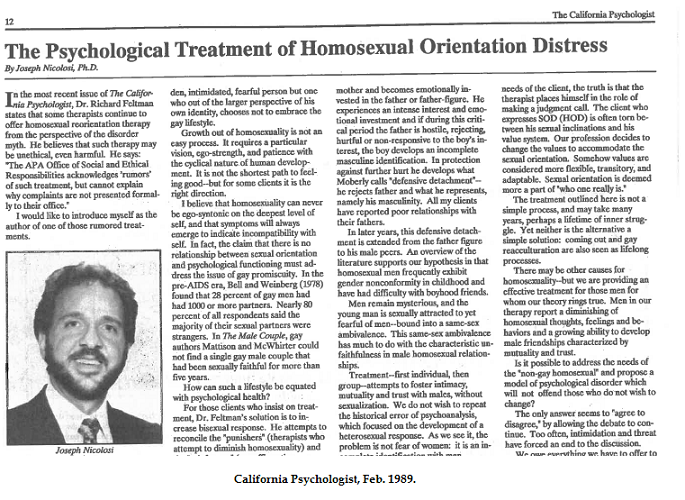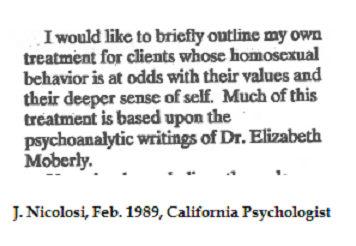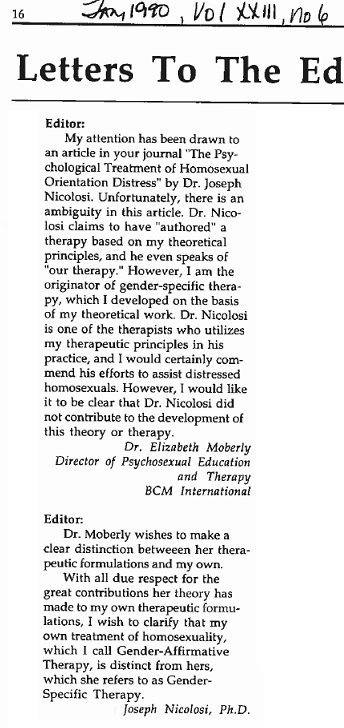After the closing of Exodus International, the wind went out of the sexual reorientation sails. In June of last year, former ex-gay organization Exodus International leader Alan Chambers said the movement was “gasping for air.”
However, a quiet breeze may be blowing still as demonstrated by a study being conducted by one of the luminaries of reparative therapy, Joseph Nicolosi and relative newcomer Carolyn Pela. Nicolosi and Pela summarized their preliminary findings at a meeting of the Christian Association for Psychological Studies a year ago. Nicolosi described the study on his website:
Dr. Pela described the study as being longitudinal with a within-group repeated-measures design. Their dependent variable was psychotherapy as conducted at Dr. Nicolosi’s Thomas Aquinas Psychological Clinic. The independent variables were (1) well-being as operationalized by the Outcome Questionnaire 45 (OQ-45.2), a highly respected measure of psychotherapy process and outcome, and (2) separately assessed dimensions of sexual orientation, namely, thoughts, desires, behavior, and identity. Data collected to date involved 102 male psychotherapy clients who presented with ambivalence, discomfort, or distress regarding their SSA. Eighty-one participants had been involved in the study long enough to have well-being assessed and data on change were available from 56 participants at the time of the CAPS presentation.
I am pretty sure the dependent and independent variables are reversed in his description. The independent variable is what is manipulated in an experiment and the dependent variable is a measure of results (see this brief explanation). That problem aside, what did they find?
Findings from preliminary data collected over a 12 month period indicated statistically significant reductions in distress and improvements in well-being, significant movement toward heterosexual identity, and significant increases in heterosexual thoughts and desires with accompanying significant decreases in homosexual thoughts and desires. Effect sizes for these changes were generally in the moderate range, which suggests they are robust and not likely to be statistical artifacts. The findings did not discover significant change in heterosexual or homosexual kissing or sexual activity. These findings appear to have been the result of very low base rates in these behaviors among study participants leading to floor effects and a subsequent lack of change, as it is not possible to change a behavior in which participants are not engaging.
To summarize, the participants were thinking straighter but not doing anything about it.
To me, this result is understandable. If one is in treatment with the stated goal to think more about heterosexual outcomes, then there would be strong motivation to produce those experiences when asked. However, the test for any actual change will be when therapy is over and the regular rehearsal of such ideas isn’t happening. The difference between process changes (how a client feels during therapy) and outcome changes (what remains after therapy is over) is often great. Reorientation therapy studies are filled with people who said they had changed during the study but then felt differently months or years later. Thus, follow up must be a key component of any therapy study.
It should be pointed out that this study isn’t a true experiment since there is no control group. There isn’t a way to test for the effect of the passing of time. Spontaneous fluidity has been reported and it isn’t clear without a control group that psychotherapy is responsible for any change that is reported (or to what degree the therapy is responsible). Without a long term follow up and a control group, this study won’t provide much more information than we already have.
Finally, if Nicoloso and Pela truly want a potent and believable pre and post measurement, they should take Northwestern University professor Michael Bailey’s offer to conduct brain scans of the participants. Some years ago, Bailey informed Nicolosi that he could bring his patients to the lab to test their automatic responses to erotic cues. Nicolosi never took him up on the offer. I recently asked Bailey if the offer was still good. He answered in the affirmative. Pre (or even mid) treatment scans compared with post-treatment scans would help to offset the lack of a control group.


